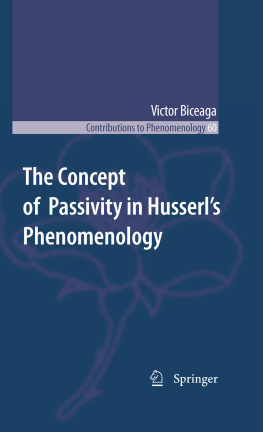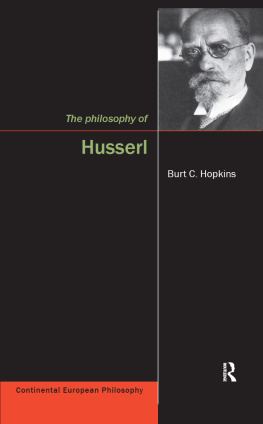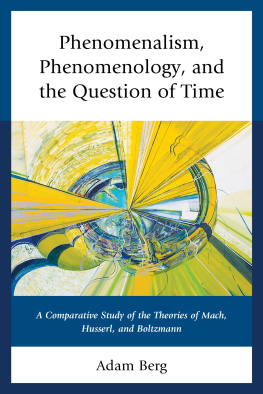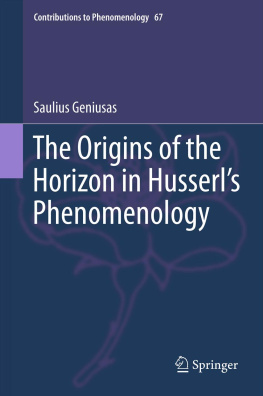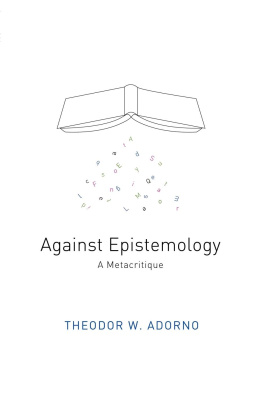Husserl
This second edition of David Woodruff Smith's stimulating introduction to Husserl has been fully updated and includes a new ninth chapter featuring contemporary issues confronting Husserl's phenomenology. It introduces the whole of Edmund Husserl's thought, demonstrating his influence on philosophy of mind and language, on ontology and epistemology, as well as ethical theory, and on philosophy of logic, mathematics, and science.
Starting with an overview of Husserl's life and works, and his place in twentieth-century philosophy, and in Western philosophy as a whole, Smith introduces Husserl's conception of phenomenology, explaining his innovative theories of intentionality, objectivity, subjectivity, and intersubjectivity. In subsequent chapters Smith covers Husserl's logic, metaphysics, realism and transcendental idealism, epistemology, and (meta)ethics. Finally, the author assesses the significance and implications of Husserl's work for contemporary philosophy of mind and cognitive science.
Also included is a timeline, glossary, and extensive suggestions for further reading, making Husserl, second edition, essential reading for anyone interested in phenomenology, twentieth-century philosophy, and the continuing influence of this eminent philosopher.
David Woodruff Smith is Professor of Philosophy at the University of California, Irvine, USA. He is the author of Mind World: Essays in Phenomenology and Ontology (2004) and the co-editor (with Amie L. Thomasson) of Phenomenology and Philosophy of Mind (2005).
Routledge Philosophers
Edited by Brian Leiter
University of Chicago
Routledge Philosophers is a major series of introductions to the great Western philosophers. Each book places a major philosopher or thinker in historical context, explains and assesses their key arguments, and considers their legacy. Additional features include a chronology of major dates and events, chapter summaries, annotated suggestions for further reading and a glossary of technical terms.
An ideal starting point for those new to philosophy, they are also essential reading for those interested in the subject at any level.
Hobbes
A.P. Martinich
Leibniz
Nicholas Jolley
Locke
E.J. Lowe
Hegel
Frederick Beiser
Rousseau
Nicholas Dent
Schopenhauer
Julian Young
Freud
Jonathan Lear
Kant
Paul Guyer
Husserl
David Woodruff Smith
Darwin
Tim Lewens
Aristotle
Christopher Shields
Rawls
Samuel Freeman
Spinoza
Michael Della Rocca
Merleau-Ponty
Taylor Carman
Russell
Gregory Landini
Wittgenstein
William Child
Heidegger
John Richardson
Adorno
Brian O'Connor
Forthcoming:
Aristotle, second edition
Christopher Shields
Kant, second edition
Paul Guyer
Freud, second edition
Jonathan Lear
Hume
Don Garrett
Smith
Eric Schliesser
Habermas
Kenneth Baynes
Mill
Daniel Jacobson
Plato
Constance Meinwald
Dewey
Steven Fesmire
Nietzsche
Maudemarie Clark
David Woodruff Smith
Husserl
Second edition
Second edition published 2013
By Routledge
2 Park Square, Milton Park, Abingdon, Oxon, OX14 4RN
Simultaneously published in the USA and Canada
by Routledge
711 Third Ave, New York City, NY 10017
Routledge is an imprint of the Taylor & Francis Group, an informa business
2007, 2013 David Woodruff Smith
The right of David Woodruff Smith to be identified as the author of this work has been asserted by him in accordance with sections 77 and 78 of the Copyright, Designs and Patents Act 1988.
All rights reserved. No part of this book may be reprinted or reproduced or utilized in any form or by any electronic, mechanical, or other means, now known or hereafter invented, including photocopying and recording, or in any information storage or retrieval system, without permission in writing from the publishers.
Trademark notice: Product or corporate names may be trademarks or registered trademarks, and are used only for identification and explanation without intent to infringe.
First published in 2007 by Routledge
British Library Cataloguing in Publication Data
A catalogue record for this book is available from the British Library
Library of Congress Cataloging in Publication Data
Smith, David Woodruff, 1944
Husserl / By David W. Smith. Second edition.
pages cm. (Routledge philosophers)
Includes bibliographical references and index.
1. Husserl, Edmund, 18591938. I. Title.
B3279.H94S54 2013
193dc23
2013001842
ISBN: 9780415622561 (hbk)
ISBN: 9780415622578 (pbk)
ISBN: 9780203742952 (ebk)
Typeset in Joanna MT and Din
by Keystroke, Station Road, Codsall, Wolverhampton
For the SmithDouglas ensemble
Contents
One
Husserl's life and works
Two
Husserl's philosophical system
Three
Logic: meaning in language, mind, and science
Four
Ontology: essences and categories, minds and bodies
Five
Phenomenology I: the new science of conscious experience
Six
Phenomenology II: intentionality, method, and theory
Seven
Epistemology: beyond rationalism, empiricism, and Kantianism
Eight
Ethics: values founded in experience
Nine
Husserl's legacy and Husserlian philosophy today
This book is a study of Edmund Husserl's overall system of philosophy, presenting his development of phenomenology in relation to his theories in logic, ontology, epistemology, and ethics. Husserl is of course renowned as the founder of phenomenology, the first-person science of consciousness. In the present interpretation of Husserl's system, however, phenomenology does not stand alone, as the sole foundation of the system; rather, it stands in interdependence with further principles in logic, ontology, etc.
For the second edition of Husserl I have written a new ninth chapter, addressing Husserl in the context of contemporary philosophy. Otherwise, the text of the first edition is unchanged, preserving the focus on Husserl's holistic system of philosophy. The ninth chapter overviews Husserl's historical legacy (incorporating material from the first edition), and then wrestles with how Husserlian theory might handle contemporary problems in the theory of consciousness and its ontology. In this new discussion a sympathetic critique of Husserl's transcendental phenomenology we address four interconnected issues that have come into sharp focus especially in the last decade.
First, in the age of neuroscience, where does the phenomenal character of our experience what it is like subjectively fit into the scientific image of the natural world, where consciousness emerges from neural activities in the brain? This is called the hard problem in the science of consciousness. Second, granting phenomenal character, exactly which features of an experience make it conscious, defining awareness per se? Its intentionality (being already a consciousness-of-something)?, or perhaps a higher-order monitoring of its transpiring (implemented by the hippocampus)?, or simply its appearance in the temporal flow of consciousness? Third, what place do nontemporal
Next page

